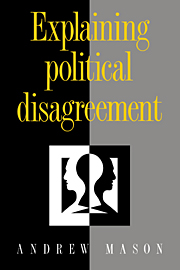Book contents
- Frontmatter
- Contents
- Preface
- Acknowledgements
- Introduction
- 1 Differences in values
- 2 The notion of an essentially contested concept
- 3 The miscommunication thesis
- 4 Integrating rational and non-rational explanations
- 5 A model for explaining some moral and political differences
- Concluding remarks
- Appendix
- Bibliography
- Index
Appendix
Published online by Cambridge University Press: 18 December 2009
- Frontmatter
- Contents
- Preface
- Acknowledgements
- Introduction
- 1 Differences in values
- 2 The notion of an essentially contested concept
- 3 The miscommunication thesis
- 4 Integrating rational and non-rational explanations
- 5 A model for explaining some moral and political differences
- Concluding remarks
- Appendix
- Bibliography
- Index
Summary
The explanatory model developed in chapter 5 relies heavily on Nancy Chodorow's theory of the construction of gender and Carol Gilligan's account of gender differences in moral reasoning. Both of these have been subject to criticism. In this appendix I propose to consider what can be said in response to the objections to their work which are the most relevant to my project.
PART I: ON SOME CRITICISMS OF CHODOROW'S THEORY OF GENDER CONSTRUCTION
In the first part of this appendix I shall consider what I take to be the most pertinent criticisms of Chodorow's theory of how masculinity and femininity are acquired: firstly, the claim that the psychoanalytic concepts out of which it is constructed are problematic because the evidence for their empirical applicability is weak; secondly, the objection that Chodorow's thesis implies that persons are socially determined and as a result leaves no room for individual autonomy; thirdly, the criticism that her theory is insensitive to, and cannot explain, variations in gender identity through time, between cultures, or across race and class; fourthly, the claim that Chodorow's theory ignores structural constraints which, for example, explain why women come to mother and to occupy the particular gender roles they do.
- Type
- Chapter
- Information
- Explaining Political Disagreement , pp. 147 - 159Publisher: Cambridge University PressPrint publication year: 1993



